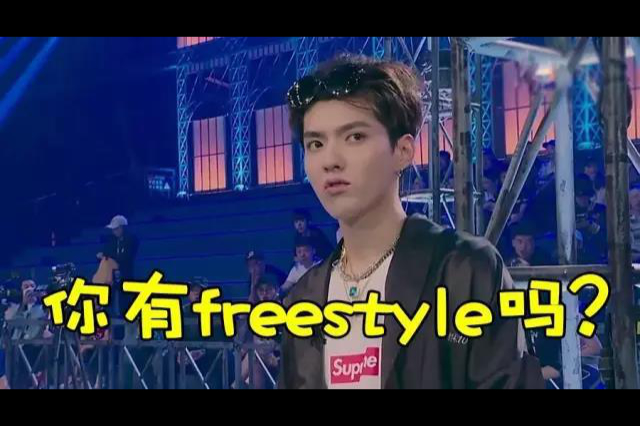Hip-hop goes mainstream in China with billions of views for rap battle reality TV
Pang-Chieh Ho gives you the latest news from film and TV in China. See her previous columns here.

The Rap of China brings hip-hop to the mainstream in China — but not without controversy
While action movie Wolf Warriors 2 (战狼二 zhànláng èr) was the film that dominated China’s summer box office, internet TV’s hit show was the reality competition The Rap of China (中国有嘻哈 zhōngguó yǒu xīhā).
Not only was its finale on September 9 (in Chinese) watched 2.68 billion times on iQiyi, the streaming platform that produced and distributed the reality show, but its popularity has inspired a torrent of memes on the internet, embedded the words “diss” and “freestyle” into China’s everyday parlance, and helped propel the booking fees of previously obscure rappers to new heights.
Before The Rap of China, rap and hip-hop had occupied a more peripheral status in China’s music industry. Artists like Helen Feng have pointed out that the success of the show has led to the commercialization of hip-hop and has turned a previously marginal and counter-cultural music form into a more accessible commodity. And while the show has helped rap gain many new fans in China, it has not been without its detractors and controversies. Al Rocco, a contestant that was disqualified from the show because his rap was in English, and not Mandarin, later released a diss track questioning the validity of the show. The show’s hip-hop credentials have been frequently contested by its critics, with many complaining that, with the exception of MC Hotdog, most of the judges on the show don’t know much about hip-hop. Among all its celebrity judges, pop idol Kris Wu (吳亦凡) has perhaps drawn the most ridicule and ire with his constant line of inquiry to contestants, “Can you freestyle?” The line itself has itself sparked much imitation and mockery, especially after internet users unearthed videos (in Chinese) of Wu’s own less-than-impressive attempts at freestyling.

But despite the criticism, there is no denying that the show has brought hip-hop and rap into the mainstream. At the finale of The Rap of China, famous Chinese director Feng Xiaogang (冯小刚) announced that he planned on making a comedy about hip-hop (link in Chinese), a decision that was greeted with enthusiasm by Kris Wu, who promised to take part in Feng’s movie. And iQiyi has already promised a bigger and more diverse format for the second season of the show, that will allow expatriates and ethnic minorities to audition.
iQiyi has been quick to tap into the many diversified revenue streams promised by The Rap of China, a show that was hailed as one of the most expensive reality shows ever produced in the country. In addition to the revenues provided by the increase of the platform’s VIP members, iQiyi is also placing its bets on other tie-ins in the nascent hip-hop industry (in Chinese), including the sale of merchandise and the development of other intellectual properties related to the show, including games, fan fiction, and live streaming shows that highlight hip-hop themes.
Popular talk show Behind the Headlines cancelled after nearly 20 years
The talk show Behind the Headlines (锵锵三人行 qiāng qiāng sān rén xíng) has been on the air since 1998, but on September 12 announced on Weibo that it would henceforth be terminated. Shortly afterwards, the title of the show became a “sensitive term” on Weibo and searches for the show on the platform yielded only this result (in Chinese): “Because of relevant laws and policies, results for this term cannot be displayed.”
Behind the Headlines was hosted by Dou Wentao 窦文涛 and produced by Hong Kong-based Phoenix TV. The show’s format consisted of conversations between Dou and two other guests, with topics including politics, entertainment, sports, and social and academic issues. Many have surmised that Behind the Headlines is one of the latest victims of a series of tightening regulations on China’s film and TV industry that have been enforced by the nation’s media regulator, the State Administration of Press, Publication, Radio, Film and Television (SAPPRFT), for the past four months.
The show’s cancellation hardly comes as a surprise, as on June 28, videos of the show became unavailable for streaming (in Chinese) on Phoenix TV’s website, iFeng. It is likely that the show, with its occasional discussions about politics, may have run afoul of the government’s latest efforts to crack down on programs that voiced negative opinions about political and social issues. On June 22, the SAPPRFT issued a notice (in Chinese) suspending programs on websites like Sina Weibo, iFeng, and AcFunTV, on the grounds that the platforms did not possess the required transmission licenses and that they were carrying commentary programs that expressed negative and dissident political views. According to What’s on Weibo, shortly after the notice, Phoenix TV made promises to alter its content to conform to the SAPPRFT’s orders, but it would seem that that was not enough to appease the media regulator when it came to Behind the Headlines.
Behind the Headlines joins the ranks of shows like The Jin Xing Show (金星秀 jīn xīng xiù), Go Fighting! (极限挑战 jíxiàn tiǎozhàn), and Where Are We Going, Dad? (爸爸去哪儿 Bàba qù nǎ r), all programs that have been axed or temporarily halted in the past few months due to the SAPPRFT’s censoring of variety and talk shows (in Chinese). The suspension of variety shows has proven to be a headache (link in Chinese) to China’s TV stations and broadcasters, many of which relied on variety and reality shows to bolster their ratings and which now have to contend with premium online content provided by streaming sites for the viewers’ attention.






